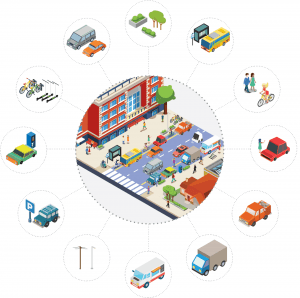
Those are the words that Donald Shoup used to describe the curb during a session at the LA CoMotion Conference a few months ago. And he is right. For years, curb space has primarily been allocated to the storage of private vehicles through the provision of short- and long-term on-street parking. While there have always been competing demands placed on this limited space, it has never has been as in demand as it is today. There are all kinds of reasons for the heightened demand—the introduction of transportation network companies like Uber and Lyft, the growth in dockless shared mobility devices like electric scooters, the continued growth of e-commerce, and the ease of in-app ordering combined with low-cost delivery, often provided by courier services like Grubhub and Doordash. All those drivers, couriers, riders, mobility service providers, etc. are in need of curb space, so perhaps it’s no wonder that this previously overlooked bit of real estate is becoming hotly contested.
Here’s the dilemma—or rather ONE of the dilemmas: “Most cities don’t currently have digital maps that would allow them to regulate curb users in anything approaching real time,” as reported in Citylab. This is a big problem in the era of new mobility we now live in. Cities need this data in order to better regulate this space, but that data hasn’t always been easy to come by or collect. Enter companies like Coord, Populous, and Remix. In “The Race to Code the Curb,” Andrew Small and Laura Bliss of Citylab break down the various efforts underway to fill this massive data gap while contextualizing some of the issues. For instance, what granularity of data is needed in order to regulate the space? What privacy issues exist? As Andrew Small and Laura Bliss write: “some of the new, data-oriented products that aim to pave over conflicts at the curb are also raising new conflicts about privacy and governance of public space. In attempting to combine real-time and long-term efforts to manage the curb, cities could risk overstepping their right to surveil the action.”
Needless to say, there is lots to discuss about management of the curb and we recently explored some of those questions in our new report about New Mobility in the Right-of-Way. But there is still much more to discuss about the curb AND about data—data privacy, data gathering, data sharing—and we’re excited to have an opportunity do so at the Urbanism Next Conference. We’ve got two sessions devoted to the curb: “Bringing the Curb Back: How Cities Are Innovating in 20ft” and “‘I’m All for Progress, It’s Change I Don’t Like’: Pushing Past the Bias to Keep the Curb the Way It Is.” And as for data, we’ll have folks from the aforementioned Populous and Remix (among others), exploring the topic in “Harnessing Shared Mobility Data to Help Cities Redesign Streets of the Future” and “Data Is a Girl’s (and City’s) Best Friend.” If you’re interested in these topics, we hope you’ll consider joining us for these discussions…as well as many others about how we can harness emerging technologies to create the outcomes we want to see.

